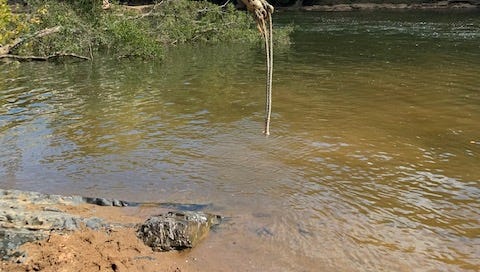Thank you all for your comments and shares of our “School Bus Elegy” post from two weeks ago. I continue to think about Elizabeth’s comment: “so many ‘public goods’ have vanished or been so depleted by a legislature and culture intent on reducing us to an individualistic, consumer society.”
This week I read Virginia Sole-Smith’s post in Burnt Toast about the universally free school lunch program, available now to all school districts that opt in. It could become a permanent benefit, but only if more parents make use of it. Sole-Smith reports:
[T]he reality is that participation rates drive this program’s funding: “When millions of families [pack lunch], their actions reduce the political will and financial resources necessary to make public school lunches better for everyone,” wrote [author of The Labor of Lunch Jennifer} Gaddis last year. I checked in with Gaddis yesterday and she confirmed that this is still true, even though lunch is now free. The federal government reimburses schools per student eating lunch and they reimburse at the highest rate per students eating for free, so schools can now receive the maximum subsidy.
Perhaps even more important: When lunch is free for everyone, then the kids who need free lunch aren’t stigmatized by the kids who don’t. “You can often see huge divides along income and racial lines in cafeterias between the kids who get free lunch and the kids who bring lunch from home,” notes Gaddis. “If we want to create spaces in our schools that are inclusive and welcoming for all, participation really matters. When people with the economic means opt out of school lunch, it sends the message to policy makers that this is a program they don’t really have to care about.”
I think the same thing is likely true about school buses—that if we stop using them because we can get along without them, or because we think an hour on the bus is too much for our kids, it will mean that buses become harder for people to use, especially kids with no other option, as Anne points out. And maybe buses won’t disappear, exactly, but school districts may get the idea that buses (and bus drivers) are part of the educational experience they don’t need to care about.
I was wondering if this “use it or lose it” idea could be applied to another shared resource, which is anger. I’ve spent a lot of time this fall feeling pretty angry about Covid-19. I know it’s not fun, and it feels pretty punishing sometimes. But it also feels useful, at least when combined with the collective outrage and actions of other people, like the UE 150 and AAUP, unions (to the extent that we have unions in NC) that have pushed for better worker and community protections at my university, which has still not mandated vaccines even though it both possible and potentially legally required for its employees.
The attitude at work is that things are pretty good—or, at least, that things are getting better. By some metrics, they are. I’m relieved that our school’s vaccination rate is much higher than when I reported on it a few weeks ago, now at 78%. Our confirmed cases have not spiraled out of control. Our students are, for the most part, mask-compliant inside the buildings.
But our contact tracing is still ineffective (we appear to have just a couple of people contact tracing), and we are headed into major travel times: fall break, Thanksgiving, and winter break. My barometer is not the Covid dashboard anyway, but a check-in I do once a week with one of my students. He’s a senior who also works at a local hospital as an EMT. Every week I ask him how things are going there. And every week he tells me, “Not good.” More than anyone I know, he sees the impact of going back to normal too soon: intubation and deaths of unvaccinated patients, overflowing ERs, and even infants coming in with Covid-19. He works long shifts as preparation for medical school (despite this difficult time, he has not lost the desire to become a doctor), and this week reported to me that he and his colleagues are now getting violence prevention training. Some of their regional branches are seeing patients demanding horse dewormer, and getting violent when they’re told that it’s not going to save them.
Bea, meanwhile, has been riding the bus most afternoons. The other day she came home and told me about an older kid who sat across from her and refused to wear his mask (bus riding is so sparse where we live that her school shares the bus with the middle school). Bea and her friend (who has a baby sister at home) told him he needed to wear his mask, like them. “It’s an important rule,” her friend said. “We’re on the bus, but we’re still inside.”
The boy refused. “It’s not a rule,” he scoffed, and asked them how many people they saw at the grocery store wearing masks. This hit me pretty hard—not because I expect that this particular boy will give my child or her friend Covid (though he might), but because I see how our neglect of community standards (because we’re tired of enforcing them) has trickled down.
The next night, after talking to my student about the sick babies and violent horse-paste-demanders, I went to the Trader Joe’s in Cary and saw a man, one checkout lane over, not wearing a mask—not even on his chin or his ear. He was scowling in that I-dare-you-to-challenge-me sort of way. Cary has a mask mandate; Trader Joe’s posts mask requirement signs on its doors. All of its employees wear masks throughout their shifts, which must feel extra-long these days.
I didn’t challenge him, because I knew it would probably make things worse for the employees, who likely deal with multiple people like this man, every single day. He actually had an employee push his cart of groceries to his car, and I thought about saying something to him then, in the parking lot, after the employee left.
But I didn’t; I was tired and looking forward to getting back in my car, listening to my audiobook (currently A Swim in a Pond in the Rain), and eating some cookies. It’s easier to say nothing, to save your energy, to choose your battles. But what would happen if we all chose to step up to all the battles? If all of us (the majority where I live, though certainly not everywhere) said “Wear a mask! It’s the law!” when we saw someone doing something dangerous and frankly arrogant and selfish and contributory to seventh-graders’ ideas that mask-wearing is “not a rule”?
If we think of our collective anger—about pollution and climate change, about Covid-deniers and mask-mandate-defiers, about the accommodation of racist insurrectionists—as a resource, a kind of public good that works against that individualistic, consumer society, maybe it becomes easier to marshall. I think about my student balancing twelve-hour hospital shifts with a full-time college schedule; about my good friend Cat Warren, who inspires me to be vigilant and action-focused; and my dad, who has always called out dumbasses; and local activist Michael Harris, who told a group of Graham-based Black Lives Matter protesters back in the spring that after long experience he doesn’t really believe in justice, but he does believe in accountability. “We can be each other’s accountability family,” he said.
I think about all these people, and all the kids riding school buses next to somebody who has learned the wrong thing just by paying attention to what we accept.
What do you think? Is anger or outrage something you feel you can use, or need to use, in your daily life? Who is in your accountability family? What keeps you sane?






I love the "accountability family" -- that idea is a seed that I hope will root and grow for me. Thank you for articulating all this about our responsibilities to public goods!
I do think I need to start calling people out because I have no trouble calling them out when they muscle their way ahead of someone in line, or treat people disrespectfully in another way. I speak up when I hear someone say something racist, or prejudiced so why am I not calling people out when they don't wear a mask? Thank you, Belle, for reminding me that our children are watching. Modeling is strongest form of teaching. We are shaping the America of the future through action and inaction. I can't bear the thought of a more selfish country than the one we have right now but there is always room for decline, Thanks for waking me up! My love to you and everyone in your family.